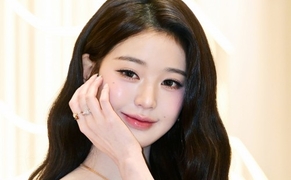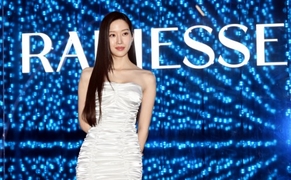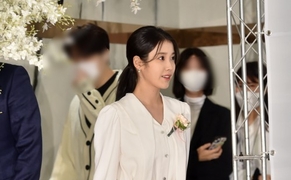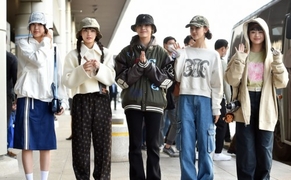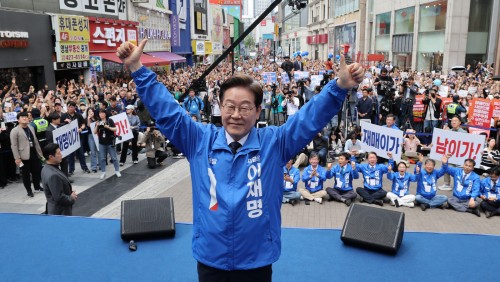 |
| Lee Jae-myung, presidential candidate of the Democratic Party of Korea, raises his hand in greeting during a major campaign rally held on Dongseong-ro in Daegu, a conservative stronghold, on May 13. / Daegu = Photo by Lee Byung-hwa (photolbh@) |
Democratic Party presidential candidate Lee Jae-myung urged voters in the traditionally conservative city of Daegu to give the progressive camp a chance, likening himself to a “new product worth trying” during a campaign rally on May 13.
Speaking at Dongseong-ro in central Daegu, Lee said, “If you blindly vote blue or red just out of habit, politicians won’t respect you. Try something new. If you don’t like it, you can always change it later. That’s how politics becomes normal.”
His remarks were a direct appeal to challenge the region’s habitual loyalty to the conservative bloc, aiming to highlight the legitimacy and potential of progressive politics in the heart of the opposition’s base. “Why insist on one color your whole life?” Lee asked. “They say in Gyeongbuk, ‘Aren’t we one of us?’ Well, I’m from Andong, Gyeongbuk too—so why doesn’t anyone say ‘Isn’t Jae-myung one of us?’”
Lee emphasized the dynamic nature of politics: “Different groups rise and fall—Yeongnam had its time, Honam had its time. What matters is making better choices. Politics is about distributing social power and resources, and whether it’s a Kim Dae-jung policy or a Park Chung-hee policy, if it helps people’s lives, it doesn’t matter if it’s left or right, blue or red, regional or ideological.”
He also criticized conservative lawmakers from Gyeongbuk, claiming they neglect constituents once elected. “To most politicians, winning nomination is everything. Once they win, they don’t need to care about locals. But in the Seoul area, a few thousand votes can change everything, so lawmakers stay close to the ground,” he said. “Woo Won-shik pitches tents for public consultations on weekends even while serving as National Assembly Speaker. Seo Young-kyo, despite her age, joins dance clubs to connect with residents. Have you ever seen lawmakers here do that?”
Lee also addressed criticism from the right over his use of the phrase "xie xie" (thank you) in diplomatic contexts. “Yes, I said ‘xie xie’—to both China and Taiwan. What’s wrong with getting along with both? Whether China and Taiwan fight has nothing to do with us,” he said. “I was going to say ‘xie xie’ to the Japanese ambassador too, but I figured he might not understand, so I said ‘thank you vely much’ instead. Is that so wrong? Politics should be about building a future for Korea.”
Touching on the controversial declaration of martial law on December 3, he said, “When people abroad heard about martial law being declared in Korea, many thought it was North Korea. But no—it was South Korea, and the world was shocked.” He praised the public response, adding, “The world is once again amazed by the Korean people, who are confronting those trying to incite rebellion without spilling a drop of blood.”
Quoting poet Lee Sang-hwa, Lee concluded, “Let the people bring spring to the land that was taken. Aren’t you the lucky swallows that usher in spring? I will walk that path with you. Please give me, Lee Jae-myung, a final chance as a useful tool to forge a new path. That’s why this moment calls for Lee Jae-myung.”
Most Read
-
1
-
2
-
3
-
4
-
5
-
6
-
7

















